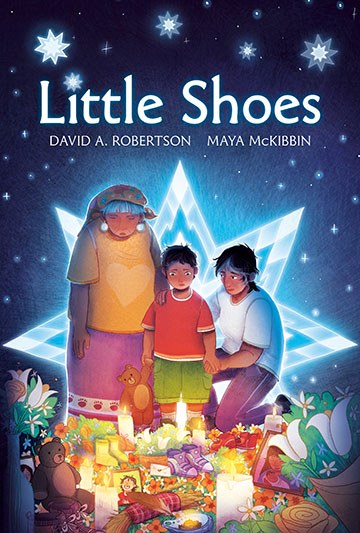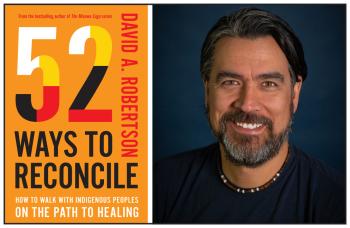Image Caption
Windspeaker.com Books Feature Writer
Local Journalism Initiative Reporter
Two-time winner of the Governor General Literary Awards, David A. Robertson, believes firmly that non-Indigenous Canadians can take a strong step toward reconciliation by reading Indigenous literature.
In fact, reading Indigenous authors takes three spots in Robertson’s book 52 Ways to Reconcile: How to Walk with Indigenous Peoples on the Path to Healing. In the book, Robertson outlines one action per week in the course of a year that non-Indigenous people can undertake. Among those actions are “start an Indigenous book club”, “start a second book in your Indigenous book club”, and his final recommendation is to share his book 52 Ways to Reconcile with others.
“I've seen it over the industry the past 10-15 years that Canadian readers are very much concerned with, more and more, reconciliation. They recognize the connection to storytelling. I really think that there's an appetite for reading authentic Indigenous stories and I think there's an inherent authenticity when you read stories about a group of people…by people with lived experience,” said Robertson.
Adding to that recognition, he says, is that Indigenous authors have shown they excel at the craft of writing.
“We're really good at it, as storytellers. That's why you see, week after week, our books on bestseller lists because we're good at storytelling. I think there's a benefit not only in the content but also in the delivery and the origin of the stories,” he said.
To that end, Robertson is adding publisher and editorial director to his resume. Tundra Book Group has introduced a new imprint, Swift Water Books, with Robertson at the helm. The imprint will publish books for children written by Indigenous authors, illustrated by Indigenous artists and “about Indigenous people in some way (and) it has to be in some way educational,” he explained.
Robertson, who along with a friend developed the idea for the Indigenous imprint, says it was their way to continue to open doors for other Indigenous authors in the same way doors were opened for them by authors like Lee Maracle, Maria Campbell, Thomas King and Richard Wagamese.
“This is really a landing place for…Indigenous writers and artists to have their work published by an Indigenous run imprint so that they know that their stories are cared for, they know that their stories are in good hands, and they know their stories are being shared,” said Robertson. “I think that's really important to have control over our own stories.”
Swift Water Books, which is part of Penguin Random House Canada, is the first Indigenous-run imprint for a major publishing house in Canadian history. So far, 13 or 14 Indigenous authors have been signed with almost 30 books scheduled to be published over the next four or five years.
While Swift Water Books will be Indigenous-oriented, books are meant to be read by everybody, Robertson emphasizes.
That’s the same philosophy he holds for his newest children’s picture book, Little Shoes, vibrantly illustrated by Maya McKibbin. When he wrote the book, Robertson says he wanted to reach non-Indigenous parents, teachers and children, but “there is an empowerment and a healing that comes from Indigenous readers reading this book” as well.

Little Shoes is about a boy who learns about Indian residential schools from his kokum. His kokum also takes him on a march and they end up at a memorial of teddy bears, flowers, tobacco, and shoes “in honour of children who had gone to residential school but had not come home.”
Little Shoes, said Robertson, is “most important for non-Indigenous parents to read to their children. I think as much as reconciliation is wide-ranging and it includes more than the residential school history, I think that's always going to be a very big part of the foundation of what reconciliation is.”
From traveling across Canada and speaking to Canadians, Robertson knows there is a desire to learn.
“Stories are an important way to deliver knowledge, to deliver information, to deliver history from a balanced and authentic perspective. And you can't ask someone to help or to work towards healing if they don't know what we're healing from,” he said.
Robertson says children will learn about the “very difficult” topic of unmarked graves and Little Shoes embraces the subject in a “gentle (way) but also doesn't look away from the truth of what happened in this country. I think that this book is for everybody.”
Robertson also contributed “letters” to two anthologies soon to be published, You Were Made for this World, aimed at youth, and A Steady Brightness of Being, geared toward adults. While both anthologies are filled with writing by Indigenous authors, Robertson says they are necessary reads for both Indigenous and non-Indigenous people.
In his contribution to You Were Made for this World, Robertson writes, “Over time you learn about who you are through stories, and eventually, you start writing your own stories. You write stories so kids don’t feel the same way that you did.”
Robertson says many Indigenous kids experience “a brokenness,” whether that’s through intergenerational trauma or trauma that's still being experienced today.
“And so how do you heal brokenness? Well, part of the ways that you heal brokenness is to understand where you came from to better understand where you are today and have a clear vision of where you want to get to. And part of that is not only reading stories and hearing stories, but understanding too that you have a story to tell and telling stories is cathartic, telling stories is healing,” said Robertson.
For non-Indigenous youth, the letters in You Were Made for this World help them gain perspective on their Indigenous counterparts and understand the values of Indigenous storytelling, he says.
“There is a universality to storytelling and its power. So I hope that a non-Indigenous youth reading this book will feel empowered themselves. Not only will they learn something, but they also feel and recognize that they have stories that they should tell, that they can tell and they ought to tell,” said Robertson. “I think that a kid is a kid…and a story is a story.”
In A Steady Brightness of Being, Robertson writes in “Learning from the Past”, that “truth is a wrecking ball. It’s a long process that many Canadians are just starting, but it’s a process that enables us to build something new on a stronger foundation.”
52 Ways to Reconcile: How to Walk with Indigenous Peoples on the Path to Healing was published by McClelland & Stewart in May.
Little Shoes is published by Tundra and will be available July 29.
You Were Made for this World (Tundra) will be available July 29, while A Steady Brightness of Being (Penguin Canada) will be available Aug. 24.
All publishers are imprints of Penguin Random House Canada. All books can be ordered online at penguinrandomhouse.ca.

